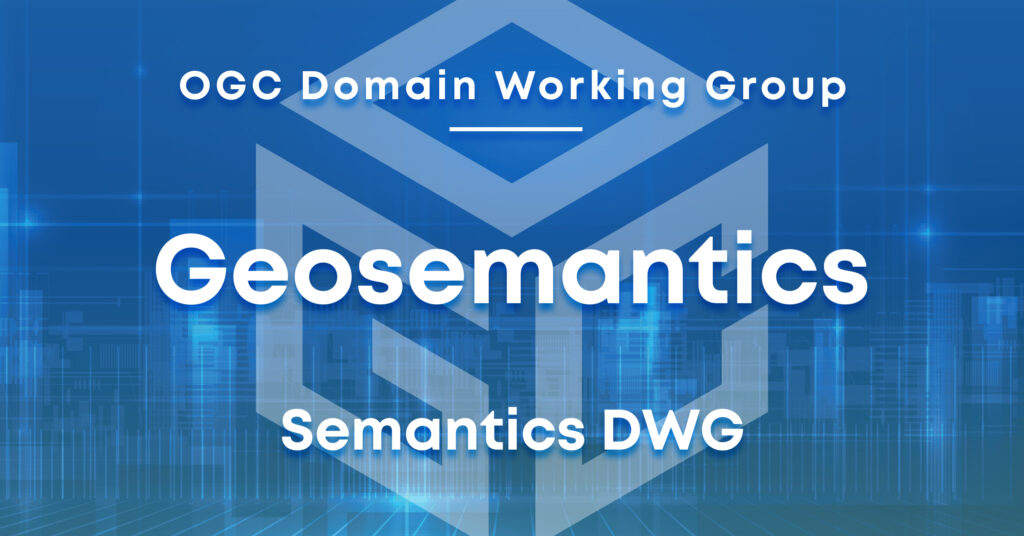OGC announces Christy Monaco as new Chief Operating Officer
As OGC’s COO, Christy will use her experience with federal agencies, partnership-building, event management, and member success to help grow and shape the Consortium.

The mission of the Geosemantics DWG is to establish an interoperable and actionable semantic framework for both representing the geospatial knowledge domains of information communities and mediating between them.
The Geosemantics Domain Working Group (DWG) has a broad scope that encompasses the facets of conceptual modeling and the formal representation of geospatial knowledge, key to advancing the interoperability mission of the Open Geospatial Consortium (OGC). A specific emphasis of the DWG is to foster the adoption or creation of innovative tools and methods that support these aims. Central to the DWG’s efforts are the interoperability and integration of spatial data on the Web, which represents a critical juncture in the intersection of geospatial and web technologies. Collaborative initiatives like the Spatial Data on the Web Working Group, launched jointly by the World Wide Web Consortium (W3C) and OGC, exemplify the DWG’s commitment. Through this partnership, the Geosemantics DWG actively participates in documenting use cases and requirements, developing best practices for the dissemination of spatial data on the Web, and promoting the evolution of current technologies into W3C Recommendations and OGC standards, thereby fostering a seamless and integrated web-based geospatial data environment.
Semantic interoperability represents the pinnacle of the interoperability goals pursued by the Open Geospatial Consortium (OGC) activities. The concept of semantic interoperability, as outlined in OGC Document 99-105r2 – Abstract Specification Topic 5, relies fundamentally on the identification of a universe of discourse and the information communities operating within it, which is especially true in the realm of discerning and interacting with geospatial features. Historically, geospatial interoperability has predominantly operated within specific communities. These communities have shared a common, though often implicit, understanding of both the feature vocabulary and the knowledge of OGC specifications vocabulary, limiting the scope of interoperability to those shared understandings and impeding broader integration across disparate knowledge domains.
The need for a semantically oriented group within the OGC was recognized as early as 1999, evidenced by Yaser Bishr’s proposal for an OGC Special Interest Group (OGC Document 99-053). Following this, a working group titled “Information Communities and Semantics” was established, which has since engaged in various but relatively limited activities. A notable advancement was the Geospatial Semantic Web Interoperability Experiment (OGC Document 06-002r1), which embarked on the semantic reformation of OGC services and encodings. This experiment explored the discovery and querying of geospatial information across multiple knowledge domains through ontology development and distributed knowledge base processing. Building on this foundation, the current charter document repositions the group as the “Geosemantics Domain Working Group,” refocusing efforts to tackle the forthcoming critical challenges and unlock the potential opportunities in geosemantic interoperability.
Restricted semantic interoperability is increasingly at odds with the Web technology embraced by OGC standards, which enables physical access to community geospatial knowledge by a diverse global audience. Lowest common denominator approaches to semantic interoperability such as GeoRSS play a vital role as a first step towards broader interoperability. Current advances in semantic and Semantic Web technology, as well as domain modeling methodologies, are providing the tools for additional steps. They need to be refined, tested and applied to OGC specifications, geospatial best practices, and GeoWeb architectures as well as the program policies and procedures which generate them.
The Geosemantics Domain Working Group (DWG) engages in a variety of critical activities to advance the application of formal semantics and conceptual modeling within the Open Geospatial Consortium (OGC) standards, architectures, and practices. A key part of their mission involves the promotion of methodologies that support the modeling and integration of knowledge domains with geospatial technologies, enabling more sophisticated and semantically-rich information communities. To broaden their impact and stay abreast of the latest developments, the Geosemantics DWG actively collaborates with other Semantic Web communities. They also establish liaisons with specialized groups such as the Geospatial XG/IG at the World Wide Web Consortium (W3C), the Spatial Ontology Community of Practice (SOCoP), and other organizations focused on geospatial semantics.
The DWG will also collaborate with other OGC Working Groups and liaise with external groups including Geospatial XG/IG at the World Wide Web Consortium (W3C), the Spatial Ontology Community of Practice (SOCoP).
Working Group Chairs: Jo Abhayaratna (PSMA Australia), Linda van den Brink (Geonovum)
Receive the latest news on OGC.
© 2024 Open Geospatial Consortium. All Rights Reserved.